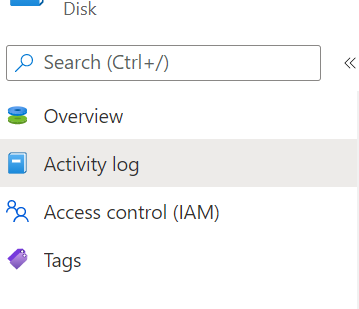@Yahav Horev | CloudTeam.ai - I understand your requirement locating all the disks which have been unattached for a certain number of days.
Unfortunately - Get-AzDisk / Rest API for getting the list doesn't return the last modified date - So, there is currently no direct way to find whether the disk was in use.
There has been a feedback documented @ the below URL :
https://feedback.azure.com/forums/34192--general-feedback/suggestions/40411429-managed-disk-last-modify-date
Alternatively, you are looking for options to delete disks that have been unattached you can refer through the article :
- https://learn.microsoft.com/en-us/azure/virtual-machines/windows/find-unattached-disks (Powershell)
- https://learn.microsoft.com/en-us/azure/virtual-machines/disks-find-unattached-portal (Portal)
However, the above will not help in identifying the days for which it has been unattached.
I did a quick testing at my end and found an alternative that may meet your requirement.
Logic:
When the disk is unattached there is an activity log created with Action Create / Update disk. You can view this in the Activity log of the disk.
Note : I tested at my end - for all the unattached disks there was final **Create or Update ** Event like below around the same time when the disk was unattached. I'd recommend confirming the similar behavior at your end.

So, once we identify the disks that are unattached (managed by eq null). We can query activity log of the unattached disks for the for say X days. if there is no logs created in the X days - we can safely assume the disk was unattached prior to those X days. If you find events/logs during the period X days - then the disk was unattached recently.
Implementation :
You can manually do this in the portal. Identify the disks by following this article (https://learn.microsoft.com/en-us/azure/virtual-machines/disks-find-unattached-portal#unmanaged-disks-find-and-delete-unattached-disks)

Filter for the Timespan for an unattached disk

Alternatively, I wrote a small snippet that makes use of the REST API to get the log activity which does the above activity programmatically.
Note: I did try Get-Azlog commandlet did not return the results - possibility that it is making use of the Stable version of the API. This action is achievable only in the preview version of the API - Per my research.
#Got the token by running Connect-AzAccount and running the below code. But you can use a better approach
$token = (Get-AzAccessToken).Token
$subscriptionid = "<YourSUBSID>"
#Getting all the disks in your Subscription
$disks = Invoke-RestMethod -Method Get -Uri "https://management.azure.com/subscriptions/$subscriptionid/providers/Microsoft.Compute/disks?api-version=2020-12-01" -Headers @{"Authorization"="Bearer $token"}
#Getting the unattached disks from the above list
$unattacheddisks = $disks.value | ? {$_.managedBy -eq $null }
foreach ($disk in $unattacheddisks)
{
$resourceid = $disk.id
#eventTimestamp is between 2021-05-09 to 2021-06-09 - You can generate a time stamp dynamically for smaller or a larger time span.
$filter = "eventTimestamp ge '2021-05-09T17:59:08Z' and eventTimestamp le '2021-06-09T17:59:08Z' and eventChannels eq 'Admin, Operation' and resourceId eq '$resourceid' and levels eq 'Critical,Error,Warning,Informational'"
#Getting the Activity logs.This is the preview API
$log= Invoke-RestMethod -Uri "https://management.azure.com/subscriptions/ $subscriptionid/providers/microsoft.insights/eventtypes/management/values?api-version=2017-03-01-preview&`$filter=$filter" -Headers @{"Authorization"="Bearer $token"}
#if there is no log returned - no activity
if($log.value.Count -eq 0 )
{
Write-Host $disk.name + " : - There is no activitiy in 30 days" -ForegroundColor Yello
}
else
{
Write-Host $disk.name + " : - There is activitiy in 30 days" -ForegroundColor Green
}
}
Output :

------------------------------------
Please do not forget to "Accept the answer" wherever the information provided helps you. This will help others in the community as well.